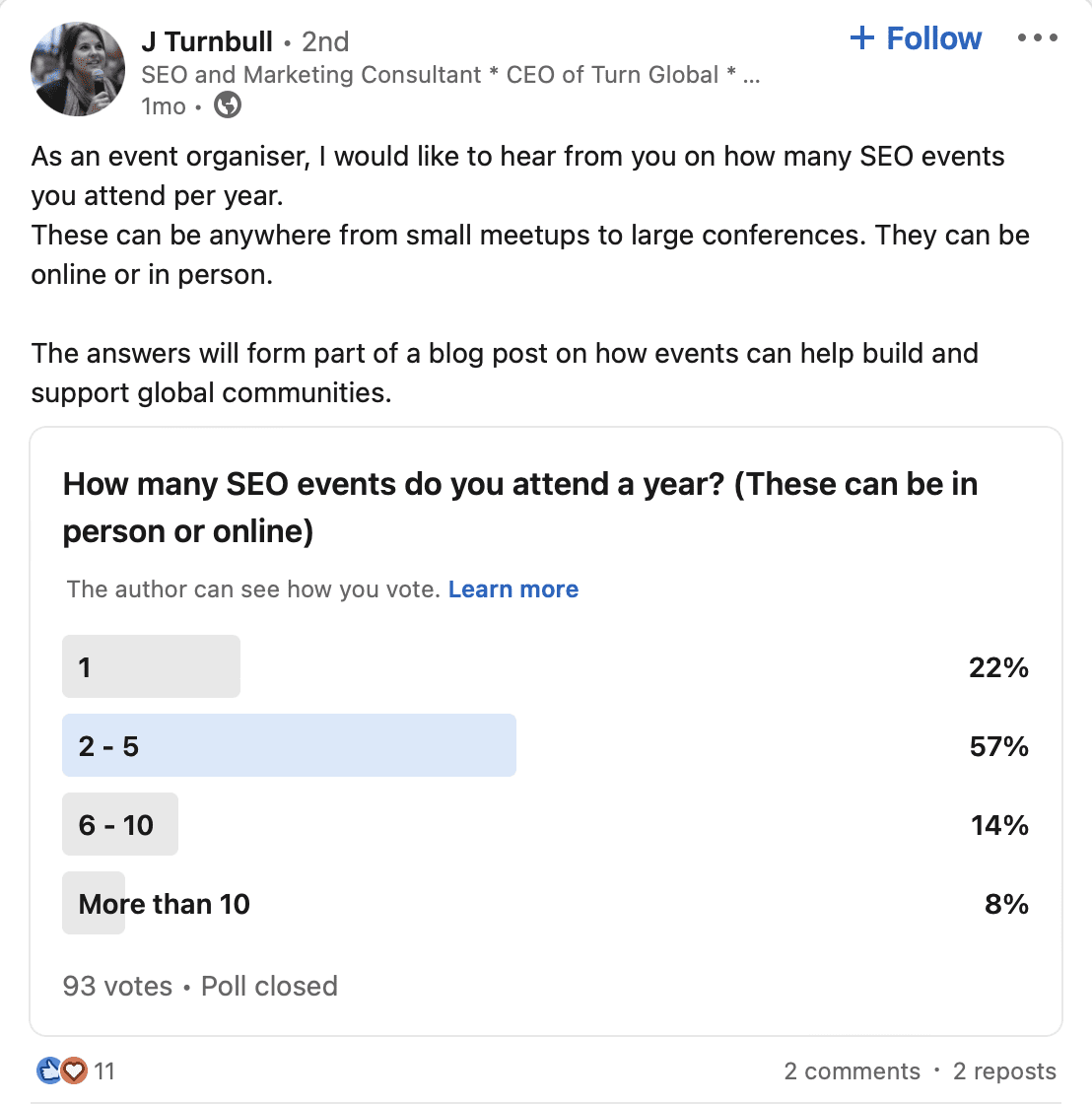In the dynamic realm of search engine optimization (SEO), my career spans nearly two decades, starting in 2004 when I started working for an agency and just two years later moved to in-house SEO for a large company.
Since then, I’ve held various in-house SEO roles at esteemed organizations, including Classmates.com, Concur, Smartsheet, ADP (usedcars.com), Nordstrom, Groupon, GitHub, and my most recent role at RingCentral – experiences which have deepened my understanding of the field and allowed me to shape SEO within different business contexts.
I began my career as an SEO specialist at the agency; my role involved understanding website optimization, keyword research, and refining on-page and off-page strategies.
When I moved to management, I had to understand how to lead a team properly.
As my journey progressed, transitioning to roles like SEO manager involved overseeing SEO strategies, developing comprehensive plans, educating and leading teams, and ensuring alignment with overarching business goals.
These roles collectively form the backbone of SEO, showcasing its dynamism and emphasizing each position’s indispensable role in driving effective digital marketing strategies.
My journey isn’t that much different from that of many SEO professionals, aside from the fact that some SEO pros may decide to stay with an agency or focus on consulting rather than working for another company.
There are so many avenues one could go down when choosing their career path for SEO, so let me help break it down.
SEO Roles
As someone immersed in the SEO field for many years, I fully understand today’s many diverse SEO roles.
Let’s explore these roles, the average salaries in the US, and advice I have for anyone looking to move into these roles, considering both their nuances and the path ahead for aspiring SEO professionals:
SEO Specialist
Embarking on the SEO journey often starts as a specialist. In this entry-level role, one will dig into the complexities of optimizing websites to boost rankings.
As a specialist, my early days involved conducting keyword research, analyzing website performance, and implementing strategies that enhanced organic visibility for clients.
This foundational role serves as a stepping stone to grasp the fundamentals of digital marketing in both the agency and in-house environments.
- Salary*: $63,699 per year (Indeed).
- Duties: Focus on entry-level content optimization, conducting keyword research, and honing on-page and off-page strategies.
- Advice: This is a great role to grasp the fundamentals, immerse yourself in various facets of digital marketing, and adapt to evolving trends.
SEO Content Strategist
Transitioning to a content strategist role within SEO reveals the creative side of drafting engaging, search-engine-friendly content.
Most SEO pros in this position are expected to sharpen their writing skills and plan and optimize content calendars based on comprehensive keyword research.
As an SEO content strategist, creating informative and captivating content is paramount to retaining readers and adhering to evolving SEO best practices.
Technical SEO Manager
My background in engineering has allowed me to focus heavily on the technical aspects of SEO. The position as a technical SEO manager requires a solid knowledge of coding, engineering processes, and database management.
The role of a technical SEO professional involves handling site structure, indexing, and resolving intricate technical issues that impact search performance.
Responsibilities extend to collaborating with engineering teams, ensuring effective communication, and mitigating risks associated with technical SEO.
This role requires a unique blend of technical acumen and collaborative skills.
- Salary*: $99,548 per year (Indeed).
- Duties: Tackle technical aspects impacting search performance, focusing on site structure, indexing, and technical troubleshooting.
- Advice: Understand what goes into the development of a website, including the various coding languages (HTML, CSS, JavaScript, Java, Python, React, Angular, etc.), database connectivity, and server administration, followed by the specifics of what Google expects and recommends for the benefits of SEO. In addition, SEO pros are expected to cultivate collaboration skills and have a solid understanding of using tools like Botify to aid in effective communication with engineers, which is pivotal for project success and seamless cooperation.
Link Building Specialist
As a link building specialist, the focus shifts to acquiring high-quality backlinks to enhance website authority and rankings.
This role demands persistence in building relationships, performing strategic outreach, and executing link-building strategies.
SEO pros interested in pursuing a career focused on off-site SEO must demonstrate the meticulous effort and specialization required in acquiring valuable links, making this role a dynamic and rewarding part of the SEO landscape.
- Salary*: $63,699 per year (Indeed).
- Duties: Acquire high-quality backlinks from relevant sites to enhance website authority, involving relationship-building and strategic outreach.
- Advice: Develop persistence and relationship-building skills; the role demands time and specialization in acquiring valuable links while avoiding what could be considered spammy links. It would be very detrimental to a link building specialist’s career if they were to get a website banned by Google for using bad practices.
Local SEO Specialist
Optimizing websites for local searches can be a specialized avenue in any SEO journey.
Local SEO specialists manage local citations and Google My Business profiles and ensure consistent NAP (Name, Address, Phone Number) data for region-specific platforms.
This role highlights the importance of attention to detail and local nuances for businesses aiming to attract nearby customers.
- Salary*: $62,852 per year (Indeed).
- Duties: Optimize websites for local searches, manage local citations and Google My Business profiles, and ensure NAP data consistency.
- Advice: Understand the nuances of local SEO; attention to detail and consistency are key for localized online visibility. Learn the various tools available to help manage these listings, such as RenderSEO and Yext.
Ecommerce SEO Product Manager
Working at ecommerce companies brings a unique challenge of its own.
SEO product manager roles require an SEO pro to specialize in optimizing online stores; the focus shifts to product optimization, category pages, site structure, and enhancing user experience.
Balancing SEO knowledge with product management skills becomes essential in navigating this niche, offering both challenges and lucrative opportunities.
- Salary*: $117,277 per year (Indeed).
- Duties: Specialize in optimizing online stores, focusing on product optimization, category pages, and user experience.
- Advice: Combine SEO knowledge with product management skills; leveling up enhances prospects in this unique and lucrative niche.
SEO Consultant
My role as an SEO consultant involved advising businesses on enhancing online visibility. Analyzing websites, developing customized strategies, and offering guidance on effective SEO became integral.
The SEO consultant role offers relief when I find myself out of work in my in-house roles due to a layoff or if the company culture isn’t a good fit.
While my consulting is a second and infrequent role, many SEO pros decide that consulting is what they prefer to do full-time.
Either way, providing optimization services to companies neglecting SEO is a great way to make a substantial income.
- Salary*: $63,298 per year (Indeed).
- Duties: Advise businesses on improving online visibility, analyzing websites, developing strategies, and offering SEO guidance.
- Advice: Gain diverse optimization experience; providing services to companies neglecting SEO can yield rapid improvement.
SEO Account Manager
Anyone interested in an SEO account manager role will experience the dynamic facet of serving as a bridge between clients and staff.
Meeting clients to understand their needs and relaying information for improved optimization efforts is the cornerstone of this position.
Performance-driven account managers could earn additional commissions, adding an incentive-driven layer to the role.
- Salary*: $68,314 per year (Indeed).
- Duties: Serve as a company’s point of contact, meeting clients and relaying information for improved optimization efforts.
- Advice: Understand industry standards; performance-driven account managers can earn additional commissions, boosting income.
SEO Data Analyst
An SEO data analyst role involves collecting and interpreting website performance and search rankings data.
Using tools like Google Analytics, Semrush, and Botify while obtaining knowledge of running SQL queries provides insights to inform strategic decisions.
This role underlines the significance of data analysis, specifically focusing on SEO-related metrics and their implications.
- Salary*: $76,575 per year (Indeed).
- Duties: Collect and interpret website performance and search rankings data, offering insights for strategic decisions.
- Advice: Know how to run SQL queries and manipulate data in Excel. Focus on SEO-related data analysis and understanding traffic from various search engines to improve decision-making.
SEO Manager
The majority of my roles in my career have been under the SEO manager title.
Those roles involved overseeing entire SEO strategies, developing comprehensive plans, managing teams, and ensuring alignment with overarching business goals. This mid-to-senior-level management position requires a diverse skill set.
- Salary*: $74,494 per year (Indeed).
- Duties: Oversee entire SEO strategy, develop comprehensive plans, manage teams, and ensure alignment with business goals.
- Advice: Understand what it takes to be a team leader. Nurture your team, build relationships in the organization, and articulate the benefits of what you’re asking to accomplish SEO growth. Management books like StrengthsFinder 2.0: Gallup by Don Clifton and Radical Candor by Kim Scott are great resources for becoming a good leader. If an SEO manager can tap into effective communication and leadership, the senior positions can lead to higher earnings of up to $210,000.
Notes:
The salary for the link building and local specialist roles are the same as that of an SEO specialist, since they tend to be at the same level.
In addition, the SEO product manager’s salary is taken from what a standard product manager makes since the roles are very similar.
Also, note that consultants can make upwards of $200,000 per year or more as they decide what to charge clients and how many clients they choose to take on.
*US National average salary reported by Indeed.com as of January 2024
Is SEO A Good Career Choice? Debunking Myths And Realities
Having navigated the dynamic landscape of SEO for over two decades, I have found that, while choosing a career in SEO has been rewarding, there are many things I would have done differently if I had the chance to do it all over again.
The good part about the SEO career path is that it unfolds across various roles, each offering unique challenges and opportunities for growth.
Starting from entry-level positions to assuming leadership roles like SEO manager, professionals gain a diverse skill set and invaluable experience.
However, it’s crucial to understand that the journey rarely leads to executive positions like director of SEO in larger companies and even more rarely to vice president positions.
The salaries of roles that SEO pros work with (i.e., product managers, engineers, growth managers, etc.) are much higher than what SEO pros usually make. So if it’s money you’re after in an SEO career, then you may be on the wrong path.
Agencies often embrace SEO professionals in executive roles, highlighting the need for a blended approach to SEO strategy involving in-house and agency collaboration. Still, the salaries tend to be less than for in-house roles.
Most SEO professionals should begin their journey as specialists and envision their desired position in 5 to 10 years.
If aspirations lean towards engineering, take the initiative to learn to code and acquire the necessary skills expected of an engineer. Collaborate closely with engineering teams, expressing a keen interest in contributing to their projects to transition to an engineering role.
For those eyeing executive roles in large corporations, strategically plan a career trajectory that navigates beyond SEO and aligns with roles leading to executive positions.
Typically, chief marketing officers (CMOs) have backgrounds in product marketing or growth marketing, progressing from directors to VPs in those domains before making the leap to CMO.
While SEO expertise enhances marketability, transitioning from SEO to these roles can be challenging. Therefore, be prepared to undertake the necessary steps to facilitate a smooth transition when the time comes.
For those contemplating an SEO career, embrace the diverse roles within SEO, each contributing to a robust skill set.
Junior roles provide foundational knowledge, strategists refine creativity and analytical abilities, and managers oversee comprehensive SEO plans.
It’s essential to evaluate personal preferences – whether one aspires to be a specialist excelling in a specific area or climb the ladder to managerial roles.
Be aware that large companies might not offer executive SEO positions, leading to the importance of understanding the industry’s dynamics and considering agency opportunities.
Education In SEO: Unveiling The Reality of Degrees
After spending over two decades submerged in SEO, a formal degree is not a prerequisite for a successful career in SEO.
My journey began with college, where I majored in English and Art History. However, realizing the potential in web design and development, I dropped out to focus on freelance work.
The SEO industry thrives on practical skills and hands-on experience, making degrees less significant.
Numerous online resources and guides offer a wealth of information to aid in mastering SEO techniques. It’s a field where continuous learning is integral, and personal initiative often surpasses the value of formal education.
The insights shared by others resonate with my own experiences. SEO is a realm where proven expertise often outshines academic credentials.
The industry includes individuals with diverse educational backgrounds, from MBAs to those without formal education. What matters most is the ability to adapt, learn, and implement effective strategies.
For aspiring SEO professionals, the key lies in taking the initiative, exploring online resources, and gaining practical experience.
Whether starting a business or pursuing a career, hands-on learning and staying updated with industry trends are the real benchmarks of success. While a degree might be a plus, it’s not mandatory for carving a rewarding path in SEO.
The Diverse Paths Of SEO
The potential routes within the SEO career landscape are numerous, starting with opportunities at agencies that provide an excellent learning ground, exposing individuals to various aspects of digital marketing.
Alternatively, one could enter an in-house position at a company where guidance from an experienced SEO professional is crucial.
Freelancing or working as an independent consultant presents another viable option, offering flexibility in the work environment and schedule.
The SEO career path encompasses a spectrum of roles, from entry-level to junior roles, strategists, managers, and senior managers, each with distinctive responsibilities and salary ranges.
Agency
One significant route involves commencing the journey at agencies, which serve as excellent learning grounds.
Working at an agency exposes individuals to various facets of digital marketing, offering a dynamic environment where skills are honed through hands-on experience.
This path allows for a comprehensive understanding of SEO within the broader context of marketing strategies.
In-House
On the other hand, individuals may choose to embark on an in-house position within a company.
The crucial guidance characterizes this path experienced SEO professionals provide in the corporate setting.
The in-house route often entails a deeper integration with the company’s goals and strategies, requiring a specialized skill set tailored to the organization’s needs.
Freelancing
For those inclined towards independence and flexibility, freelancing or working as an independent consultant represents a viable option within the SEO career landscape.
This path allows individuals to shape their work environment and schedules according to personal preferences.
Freelancers have the opportunity to work with a variety of clients, gaining diverse experiences that contribute to their professional growth.
Conclusion
In this exploration of the SEO career landscape, I am reminded of the dynamic and ever-evolving nature of SEO.
From my humble beginnings as a freelance developer optimizing websites to my most recent work as a consultant, each step has presented unique challenges and learning opportunities, adding to my comprehensive grasp of SEO.
These experiences have enriched my understanding of various business environments.
I hope this article helps readers interested in a career in SEO carve out a path for themselves.
More resources:
Featured Image: New Africa/Shutterstock










